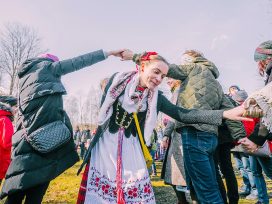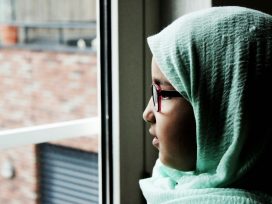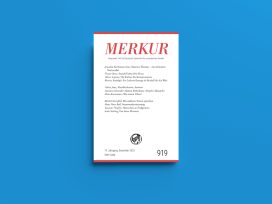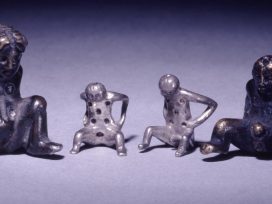Host: You used to be a musician, a singer. But you decided to give up your musical carrier and start a completely different literary carrier. Why?
Margriet de Moor: In fact, there was no real connection between giving up music and turning to literature. I just gave up my musical career because I did not like the stage, the immediate confrontation with the audience. I always envied artists like painters, who are working in the privacy of their studios. For a long time I was only a reader. I was always a passionate reader, but there was no particular intention concerning writing. I didn’t plan it, but then one Monday morning I just thought that I could tell a story, and I started and I never stopped…
Host: Do you see any difference between musical expression and literary expression, or do you feel you are doing the same thing by other means?
MdM: Literature and music are closely related, but of course, they are different arts. The process of making a story, writing a novel, building up its structure and composition, thinking about the beauty of expression, is very much related to what you experience while performing music. I think the only explanation why I could start writing just like that is my musical education which is, opposed to literature, a very abstract discipline. However, I was able to make use of it at my desk; I immediately felt completely at ease. As concerns the difference between music and literature – naturally they both tell a story, but the story of literature is very concrete, you need characters, you need events, and you need plots. In a way literature is as abstract as music and it is needless to speak about the beauty of it, but at the same time it is connected to everyday life. The moment you start telling the most banal story, and you start writing it down, it becomes something else. And it is this ambiguity that I like very much about literature: it is as abstract as music but it pretends to mirror things from real life.
Host: Is it possible that literature can express something music cannot? If so, then it may have played a role in your route to literature…
MdM: No, as I have said, my writing has no direct connection to music. Music is something very different and also very powerful. You can never pretend to express something music can’t. There is no question of expressing this or that in this or that way. But what I was looking for – and I realised that only afterwards – were big themes. Holland is a very small country. But also your own country proves that being a small country doesn’t mean that you don’t have big themes. For example, one of my previous novels, Prince of Egypt, treated the theme of Gypsies. The Netherlands is a very tolerant country, but I wanted to show that nothing is as smooth as it might seem, and my viewpoint is very critical. And there is the water catastrophe story in The Drowned. I think I was the first one in the Netherlands who picked up on it as a big literary theme, concentrating on a catastrophe of half a century ago, however strange it sounds.
Host: In one of your texts you speak about the relationship between literature and real life. In your words it is not literature which reflects real life, but rather the opposite; real life is a reflection of literature, it is made up by it. What do you mean by this concept?
MdM: This really is my favourite idea, and I am convinced of it. We always make stories out of the real events, but these stories in turn influence the behaviour of people. The theme of love making in our age is very much influenced by novels, by poems, going back even to the era of the troubadours. That is an obvious example, but we can take a subtler one – looking at landscapes, experiencing the beauty of landscapes, travelling, in fact, any aspect of our lives is deeply influenced by stories and the images of these stories.
Host: Your novel Kreutzer Sonata could be taken as a clear example, an embodiment, of this idea. There is a piece of art in the centre, and everything revolves around it, the characters’ fates evolve from it…
MdM: Kreutzer Sonata really explores this concept to the extreme. And the reason is that I really like Janáchek. When I heard that he had composed an opus, a string quartet, called the Kreutzer Sonata, my story was immediately there. Such a powerful theme, going on and on, including not only the arts, which is the centre of my story, by also involving how people behave under the influence of music, destructive behaviour, in this case…
Host: Nevertheless, in your latest novel The Drowned, you proceed conversely. Here, the central theme is an historical event, and you seem to try to explore whether, and how, real events can lead to a work of art…
MdM: That is of course the principle of all novels and literary stories: you tell a story of an historical dramatic event and when you succeed it turns into a work of art. That is what the novel is, and from this point on you become a writer. There is the event, there is the novel, and then there is the reader. The reader is always present personally, and that is what makes art so beautiful. It makes the reader very independent of the writer. I don’t believe very much in the connection between the author and the reader. The work itself is always between them.
As for The Drowned, I started it twice but I didn’t have the inspiration to make it a good novel, so I had to leave it. The event is so powerful that you can easily commit the mistake of assuming that it is sufficient, but that is not true. I could only succeed when I used this idea of two lives, a short and dramatic one, and a normal long life that we normally live. These two lives are intertwined, and what the novel says is that the short, dramatic life is exactly as complete as the long, normal life. The novel also illustrates this by means of its structure: the number of pages dedicated to Lidi, who has only 36 hours to live when the novel starts, and those dedicated to Armanda, who has 75 years, are almost exactly the same.
Host: Now let’s speak about two of the themes in the novel, the theme of destiny and of accident. It seems that they are crucial in the lives of your characters. The force of destiny is put forward by your very approach to your characters when you anticipate many times what will happen next. On the other hand, there is the accident when the sisters just exchange their roles, and what follows has an enormous impact of their lives. Can you explain more on these concepts in the novel?
MdM: One could say there is a lot of accident in this. One could also say there is no accident at all. We have two elements, the storm and Armanda’s telephone call to Lidi. They both take place on Monday; although the flood took place during the following weekend, it was still the Monday before, thousands of kilometres away, that the pressures started coming up. This arrangement is not accidental, those depressions came here and connected with another depression from Iceland and were constructed together into this enormous catastrophe. But there was also that small call of Armanda to Lidi and then, over the weekend, it all went wrong. One could have written it from the perspective of guilt. But I wanted to say that the only one who is guilty is the storm. Also a romantic point of view could have been used: in the nineteenth century there were novels making out of natural events something personal. But I didn’t do that in this book; in fact, there is Armanda sending Lidi to her death in a way, but it was not her purpose; Lidi was killed by the storm. And there are all those people who are sleeping, including the authorities, something you can very much compare to the catastrophe in New Orleans. They thought yes, well, the storm, but it was a weekend, so they went to play cards… One could have said: guilt! Calvinism! Not at all; you can think in a different way about the book, but in my opinion they were really innocent people. Just a little bit lazy, a little bit wicked, but there is the enormous event of the storm which killed thousands of people, of animals, an entire country swept away…
Host: Yes, but in fact it was you who made this happen, who arranged this coincidence.
MdM: Perhaps I used the storm in a wicked way; in fact, I misused it – in order to show how innocent and how helpless people are. I felt great sorrow for those people, and not only for Lidi who only lived for 36 hours, but also for Armanda, who had to live for the rest of her life with that event. Her fate was sealed by that small decision.
Host: Let’s go back to the relationship between literature and music. Can you exemplify this relation by means of this very book? How did you proceed?
MdM: There really is a relation. In music it is very normal to play with tempo. And it is also very normal to have two tempi at the same time. There can be different voices going slowly and quickly, and also lower voices proceeding much more quietly in the whole. Everyone knows that in music there can be different tempi at the same time. In literature it is not as common, one would say it is impossible because it is an art based on continuity, it starts and then it just goes on. How is it possible to escape the tempo? I think in this novel it is exactly the case. There are those 36 hours of Lidi, and I don’t mean just the amount of pages, no, there is also the same amount of themes and these are themes of real life, love, friendship, Sunday afternoon meals, things which make up human life in practical terms, and they are exactly as prominent in those 36 hours as in the life of Armanda who needs 75 years for those things. So it is really playing with two tempi. And I think it is something a musician finds very natural. I didn’t have to think too much what I should do, it was just there.
Host: One of the important topics of the book is water itself. Did you use water as a symbol of something? We are in the Netherlands where water can be seen practically everywhere. Does water play an important role in Dutch literature, just as in Dutch history?
MdM: I am not a literary historian and I never did this type of study, but I think water must be a very dominant theme in Dutch literature. I am not completely aware of its symbolic meaning – when you are writing a novel you think like that continously –, but of course, water can be taken as a synonym for danger. The danger of life, the danger of dying. It sounds very simple, but in fact, the end is the only thing to fear in life. And that is what happens in the book. By the way, the book has turned out to be very topical. When I started writing, I didn’t realise how imminent the danger of water is nowadays. The Netherlands is really endangered by water. Let’s take, for example, the delta works in Zeeland, at the mouth of the Rhine. They are unique in the world, something we can be proud of, and they were conceived as a reaction to the floods of 1953, the event my novel’s plot turns around. They were planned to be used perhaps once a year, but now they must be used at least eight times a year. Then there is the dike between the provinces of Friesland and Noord-Holland which is too low and would hardly be sufficient should we be hit by a major storm. The danger of water is very topical in the Netherlands, it is more dangerous than – to say something extreme – than the coming up of Islam in our cities…
Host: Has the book caused any public debate about the topic?
MdM: Not much. It is almost as you can see in the book itself, the authorities and the population are very relaxed about that, not really focused on the danger and it is not a hot topic in public debate at all.
Host: Your books are not autobiographic; you invent your characters and stories completely. And yet your texts are very personal and you seem to be very close to your characters. How much are you present in your texts, to which extent do they ensue from your personal experience?
MdM: This really is a very complicated question, the question concerning the degree to which you tell your own life. I think that even if you are not present directly in the story, there is a lot of autobiography in writing, my own writing as well. You give the characters and the events things that belong to you; there are your questions and your interests in the whole arrangement, sometimes you can even point to something you lived through. The water theme, for instance, is evident: I was brought up at the seaside and as a young child I could even see that storm, although I cannot say it is something I always lived with. But I studied that event a lot, I went to the Meteorological Institute, and they really explained to me what exactly happened. I even got to see those beautiful old weather maps, drawn by hand, so I really started to understand the storm. It was crucial because the main character of the book is the storm itself. Another example is the theme of the sisters’ relationship. I come from a family of seven sisters, so this topic is very familiar to me. One can ask whether those two sisters from the novel had a model in reality. Well – no, I had to explore them in the novel, but of course it is a relationship that interests me. I am only mentioning the big themes, but there are also small things, animals, how the sky, the cars look to a child… One can never know how much is autobiographical and how much is pure fiction.
Host: You started writing quite late. Did that mean an important change in your life? What is the life of an important Dutch author like?
MdM: Being an author, sitting at the writing desk, doesn’t differ much from the experience of a reader and I like it a lot, I like the privacy of being alone with a book. As I have mentioned, I gave up the musical carrier because I didn’t like the direct confrontation with the audience. At the time I had no exact plans, my ideas were rather abstract, but I thought how beautiful it would be to be for example a painter. My husband was a painter and a sculptor so I knew it. Being alone in your studio, the only confrontation you have to face is the confrontation with the piece of art you are making. And you could say being a writer is something very similar. So I am very confused and astonished about how public the life of authors is nowadays. I don’t think it used to be like this. Authors would read for an audience now and then, but today they are completely public; I really do find that a little difficult. On the other hand, I cope with it quite easily. As a singer I used to be very nervous, but as a writer I am never nervous, because the book is there and you can’t spoil it with a poor performance as a speaker. And I am sometimes really astonished when I see my colleagues taking the whole thing so seriously, being so nervous and making such a big point of how it came out. It is the novel that matters, nothing else. So I am a little sceptical by all that public life. But what I like very much is being translated. My books have been translated into 26 languages, for example Albanian and Korean, and I like the whole idea. It really complies with our Dutch character: we are a very cosmopolitan people and being abroad is something very familiar to us. I like not only having my books translated, but also travelling because of them, not as a tourist but as someone who is really involved… Where my book is I feel at home.
Host: It really noticeable that Dutch authors are important public figures, something quite unknown in Czechia. Perhaps Dutch literature itself plays an important role in the public life too. If this is true, then Dutch authors should have some public responsibility. Do you feel any urge or necessity to speak about public matters?
MdM: Dutch authors are public figures, but they are regarded rather as celebrities and TV stars than as responsible personalities. There is always a very big accent on the figure itself, and the authors are mostly engaged in promoting themselves. The more you show yourself as a kind of idol, the more your books make the impression of being important, something which is not always the case. It makes it unclear whether the book is good or not, literature and ideas are obscured. If an author has good relations with the media, then it doesn’t mean that his voice is important for the debate, that he is standing for a moral question. The authors are very much concentrated on presenting themselves, and the main reason is selling, promotion. It is becoming more and more common in the Netherlands and I don’t like that very much.
Host: And you? Do you feel that urge to play a public role? To comment on public affairs?
MdM: Not really. I come from the world of art, I feel very well there and I am convinced that the authority of the artist lies in the art. Sometimes an author touches a big social or historical theme in a novel. I did, for example, in the novel Duke of Egypt and in a way also in The Drowned.
Host: But your comments on Dutch public issues can be seen on the Internet…
MdM: Sometimes, in fact, I am asked, mainly in Germany, to comment on our public life. We are in a politically interesting country again, our cities are half filled with immigrants, and we are already a crowded country, and we have had those two political murders. It is true that I have written articles, essays, about this. My view is not that pessimistic: taken all the problems I mentioned, it is interesting how public life stands calm and that there are no riots like those you see in the suburbs of Paris, no Nazi movements etc. I find it very interesting and I consider writing a novel about it one day, when I have the time and the story. That is what our world is like at the moment and I am already thinking about it. I am curious to see how it will influence our literature.
Host: A few years ago our journal was preparing a block of texts by contemporary Dutch female authors. You refused to be published in this block just because it was presented like this. Can you tell me why you didn’t like the idea?
MdM: That is true, I don’t like at all these categories of female literature and male literature. I don’t see the point, and I can also argue my case for why I don’t see it. I have always been a devoted reader and what I write is influenced by all those novels I have read. They were mainly written by male authors. As a child I hated all that female reading, those romances for young girls. I never read them. I read Karl May and The count of Monte Christo instead. Even though my characters are often – but not always – women, it doesn’t mean anything. Just look at Anna Karenina, Madame Bovary, etc., they were all written by male authors. Although I often use female heroines, it doesn’t mean I fit into some category of female writing. And one theme which is very absent from my work is the theme of women’s emancipation. The social issue of women suffering under a male dominance – no, I don’t find it terribly interesting.
Host: But still, don’t you think there is a difference between how women and men see the world? Don’t you think it can also be fruitful to categorise literature from this point of view?
MdM: Maybe so, but I have never worked this way. Women are very different in many ways as a principle, but then; what does it mean? A story or a novel is about what is happening and not about how different men and women are. Of course, when there are love stories or confrontations of male and female characters then this element is very dominant, but you also have that in Balzac, Dickens, or Tolstoy. I have just re-read War and Peace, a book which speaks very intensely about love between men and women, but Tolstoy was a male author so it doesn’t mean anything. As a theme yes, it does have a meaning, but not as a category.





